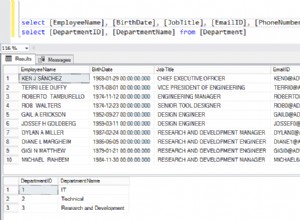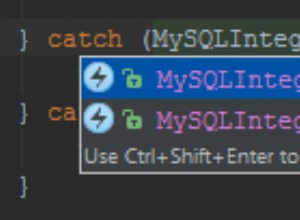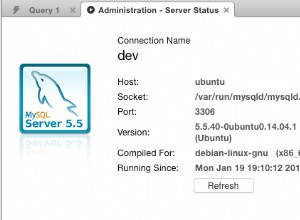Questa è una versione aggiornata della risposta, più flessibile della precedente.
Ecco un'idea usando un UNION SQL :
-
Possiamo utilizzare i dati di
posts_clausesfilter per riscrivere la query SQL daposts_requestfiltro. -
Estendiamo il
WP_Queryclasse per raggiungere il nostro obiettivo. In realtà lo facciamo due volte:WP_Query_Empty:per ottenere la query SQL generata di ciascuna sottoquery, ma senza eseguire la query del database.WP_Query_Combine:per recuperare i post.
-
La seguente implementazione supporta la combinazione di
Nsottoquery.
Ecco due demo:
Demo n. 1:
Supponiamo che tu abbia sei post, ordinati per data (DESC):
CCC
AAA
BBB
CCC
YYY
ZZZ
XXX
dove il XXX , YYY e ZZZ sono più vecchi di DT=2013-12-14 13:03:40 .
Ordiniamo i nostri post in modo che i post pubblicati dopo DT sono ordinati per titolo (ASC) e i post pubblicati prima di DT sono ordinati per titolo (DESC):
AAA
BBB
CCC
ZZZ
YYY
XXX
Quindi possiamo usare quanto segue:
/**
* Demo #1 - Combine two sub queries:
*/
$args1 = array(
'post_type' => 'post',
'orderby' => 'title',
'order' => 'ASC',
'date_query' => array(
array( 'after' => '2013-12-14 13:03:40' ),
),
);
$args2 = array(
'post_type' => 'post',
'orderby' => 'title',
'order' => 'DESC',
'date_query' => array(
array( 'before' => '2013-12-14 13:03:40', 'inclusive' => TRUE ),
),
);
$args = array(
'posts_per_page' => 1,
'paged' => 1,
'sublimit' => 1000,
'args' => array( $args1, $args2 ),
);
$results = new WP_Combine_Queries( $args );
Questo genera la seguente query SQL:
SELECT SQL_CALC_FOUND_ROWS * FROM (
( SELECT wp_posts.*
FROM wp_posts
WHERE 1=1
AND ( ( post_date > '2013-12-14 13:03:40' ) )
AND wp_posts.post_type = 'post'
AND (wp_posts.post_status = 'publish' OR wp_posts.post_status = 'private')
ORDER BY wp_posts.post_title ASC
LIMIT 1000
)
UNION
( SELECT wp_posts.*
FROM wp_posts
WHERE 1=1
AND ( ( post_date <= '2013-12-14 13:03:40' ) )
AND wp_posts.post_type = 'post'
AND (wp_posts.post_status = 'publish' OR wp_posts.post_status = 'private')
ORDER BY wp_posts.post_title DESC
LIMIT 1000
)
) as combined LIMIT 0, 10
Demo n. 2:
Ecco il tuo esempio:
/**
* Demo #2 - Combine two sub queries:
*/
$today = date( 'm/d/Y', strtotime( 'today' ) );
$args1 = array(
'post_type' => 'workshops',
'meta_key' => 'select_dates_0_workshop_date',
'orderby' => 'meta_value',
'order' => 'ASC',
'meta_query' => array(
array(
'key' => 'select_dates_0_workshop_date',
'value' => $today,
'compare' => '>=',
'type' => 'CHAR',
),
)
);
$args2 = array(
'post_type' => 'workshops',
'meta_key' => 'select_dates_0_workshop_date',
'orderby' => 'meta_value',
'order' => 'DESC',
'meta_query' => array(
array(
'key' => 'select_dates_0_workshop_date',
'value' => $today,
'compare' => '<',
'type' => 'CHAR',
),
)
);
$args = array(
'posts_per_page' => 5,
'paged' => 4,
'sublimit' => 1000,
'args' => array( $args1, $args2 ),
);
$results = new WP_Combine_Queries( $args );
Questo dovrebbe darti una query come questa:
SELECT SQL_CALC_FOUND_ROWS * FROM (
( SELECT wp_posts.*
FROM wp_posts
INNER JOIN wp_postmeta ON (wp_posts.ID = wp_postmeta.post_id)
INNER JOIN wp_postmeta AS mt1 ON (wp_posts.ID = mt1.post_id)
WHERE 1=1
AND wp_posts.post_type = 'workshops'
AND (wp_posts.post_status = 'publish' OR wp_posts.post_author = 1 AND wp_posts.post_status = 'private')
AND (wp_postmeta.meta_key = 'select_dates_0_workshop_date' AND (mt1.meta_key = 'select_dates_0_workshop_date' AND CAST(mt1.meta_value AS CHAR) >= '05/16/2014') )
GROUP BY wp_posts.ID
ORDER BY wp_postmeta.meta_value ASC
LIMIT 1000
)
UNION
( SELECT wp_posts.*
FROM wp_posts
INNER JOIN wp_postmeta ON (wp_posts.ID = wp_postmeta.post_id)
INNER JOIN wp_postmeta AS mt1 ON (wp_posts.ID = mt1.post_id)
WHERE 1=1
AND wp_posts.post_type = 'workshops'
AND (wp_posts.post_status = 'publish' OR wp_posts.post_author = 1 AND wp_posts.post_status = 'private')
AND (wp_postmeta.meta_key = 'select_dates_0_workshop_date' AND (mt1.meta_key = 'select_dates_0_workshop_date' AND CAST(mt1.meta_value AS CHAR) < '05/16/2014') )
GROUP BY wp_posts.ID
ORDER BY wp_postmeta.meta_value DESC
LIMIT 1000
)
) as combined LIMIT 15, 5
Demo n. 3:
Potremmo anche combinare più di due sottoquery:
/**
* Demo #3 - Combine four sub queries:
*/
$args = array(
'posts_per_page' => 10,
'paged' => 1,
'sublimit' => 1000,
'args' => array( $args1, $args2, $args3, $args4 ),
);
$results = new WP_Combine_Queries( $args );
Classi:
Ecco le nostre classi demo:
/**
* Class WP_Combine_Queries
*
* @uses WP_Query_Empty
* @link https://stackoverflow.com/a/23704088/2078474
*
*/
class WP_Combine_Queries extends WP_Query
{
protected $args = array();
protected $sub_sql = array();
protected $sql = '';
public function __construct( $args = array() )
{
$defaults = array(
'sublimit' => 1000,
'posts_per_page' => 10,
'paged' => 1,
'args' => array(),
);
$this->args = wp_parse_args( $args, $defaults );
add_filter( 'posts_request', array( $this, 'posts_request' ), PHP_INT_MAX );
parent::__construct( array( 'post_type' => 'post' ) );
}
public function posts_request( $request )
{
remove_filter( current_filter(), array( $this, __FUNCTION__ ), PHP_INT_MAX );
// Collect the generated SQL for each sub-query:
foreach( (array) $this->args['args'] as $a )
{
$q = new WP_Query_Empty( $a, $this->args['sublimit'] );
$this->sub_sql[] = $q->get_sql();
unset( $q );
}
// Combine all the sub-queries into a single SQL query.
// We must have at least two subqueries:
if ( count( $this->sub_sql ) > 1 )
{
$s = '(' . join( ') UNION (', $this->sub_sql ) . ' ) ';
$request = sprintf( "SELECT SQL_CALC_FOUND_ROWS * FROM ( $s ) as combined LIMIT %s,%s",
$this->args['posts_per_page'] * ( $this->args['paged']-1 ),
$this->args['posts_per_page']
);
}
return $request;
}
} // end class
/**
* Class WP_Query_Empty
*
* @link https://stackoverflow.com/a/23704088/2078474
*/
class WP_Query_Empty extends WP_Query
{
protected $args = array();
protected $sql = '';
protected $limits = '';
protected $sublimit = 0;
public function __construct( $args = array(), $sublimit = 1000 )
{
$this->args = $args;
$this->sublimit = $sublimit;
add_filter( 'posts_clauses', array( $this, 'posts_clauses' ), PHP_INT_MAX );
add_filter( 'posts_request', array( $this, 'posts_request' ), PHP_INT_MAX );
parent::__construct( $args );
}
public function posts_request( $request )
{
remove_filter( current_filter(), array( $this, __FUNCTION__ ), PHP_INT_MAX );
$this->sql = $this->modify( $request );
return '';
}
public function posts_clauses( $clauses )
{
remove_filter( current_filter(), array( $this, __FUNCTION__ ), PHP_INT_MAX );
$this->limits = $clauses['limits'];
return $clauses;
}
protected function modify( $request )
{
$request = str_ireplace( 'SQL_CALC_FOUND_ROWS', '', $request );
if( $this->sublimit > 0 )
return str_ireplace( $this->limits, sprintf( 'LIMIT %d', $this->sublimit ), $request );
else
return $request;
}
public function get_sql( )
{
return $this->sql;
}
} // end class
È quindi possibile adattare le classi alle proprie esigenze.
Uso il trucco menzionato qui
per preservare l'ordine di UNION sub query. Puoi modificarlo di conseguenza con il nostro sublimit parametro.
Questo dovrebbe funzionare anche per le query principali , utilizzando il posts_request filtro, per esempio.
Spero che questo aiuti.




